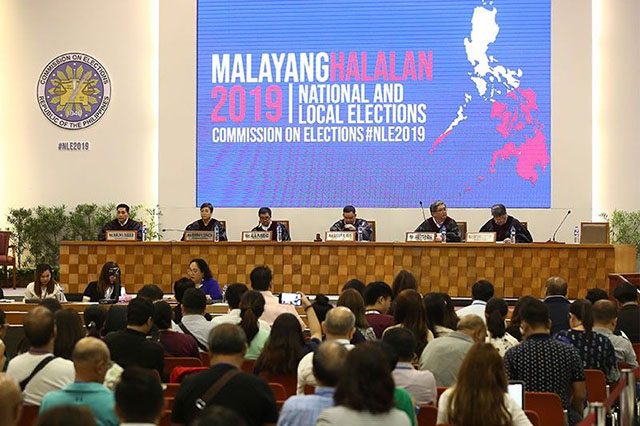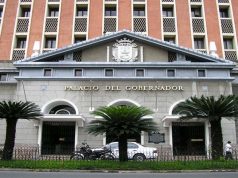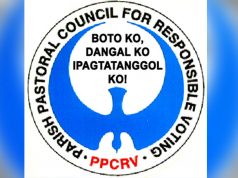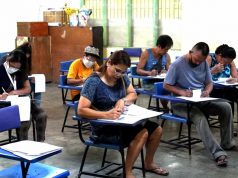
The conduct of the 2019 elections had more reports of anomalies and issues compared to the previous automated polls in 2016.
Lawyer Gregorio Larrazabal, former commissioner of the Commission on Elections (Comelec), raised concerns on the “bundled” system of procuring election paraphernalia for May 13.
The “bundled” process refers to the Comelec’s bidding out of supplies such as ballot paper, ink and SD card to one company. The supplies are “unbundled” if they came from different companies.
According to the lawyer, the poll body discontinued the practice of “bundled” components in 2013.
Hence, the last time Comelec dealt with only one supplier was during the national elections in 2010.
I think people should look at the bidding process for the procurement of supplies for the 2019 elections. How come there were more lapses in 2019 as compared to previous elections?
Cc:@teddyboylocsin— Gregorio Larrazabal® 🇵🇭 (@GoyYLarrazabal) May 15, 2019
“I warned about this back in 2013 about the dangers of unbundling. I also made suggestions to compensate and to make sure the possible holes are plugged by Comelec,” Larrazabal said on Twitter.
He also questioned Comelec’s decision for choosing a new company to review the source code for the 2019 elections.
“The International Certification Entity who reviewed the source code for the 2010, 2013 and 2016 elections was the same company. Comelec chose another company to do it for the 2019 elections,” Larrazabal said.
He went on to raise questios about the printing process of the voter information sheet and the cost of it.
“Why was the printing of the voter information sheet centralized in Metro Manila instead of the different provinces?” Larrazabal said.
“Why was the cost of printing done in Metro Manila (supposedly) around 300% more expensive than it being printed in the provinces?” he added.
Machine malfunctions
Comelec said that at least 961 vote-counting machines (VCM) have malfunctioned this year while only a total of 188 VCMs had malfunctions in 2016.
Some voter registration verification machines (VRVM) also did not work properly and electoral boards have to resort to manually verifying voters’ names.
The total number of faulty VRVM’s has yet been released.
Around 1,000 SD cards were also found defective as compared to only 120 cards in 2016, Comelec Commissioner Rowena Guanzon said.
During the counting of votes, some politicians criticized the glitches of the transparency server, the database where watchdogs and the media acquire the number of votes, this week.
The transmission server stopped sending results at 6 pm on May 13 and was only fixed at 1 am on May 14.
However, these groups claimed variations in the transmission rates.
Antabay muli sa paliwanag dahil ang Transparency Server mula 92% ngayong umaga ay biglang bumalik sa 49%! #LabanBayan #KONTRADAYA
— Sarah ng #42Kabataan (@sarahelago) May 13, 2019
Representatives Sarah Elago and Antonio Tinio demanded the poll body to explain these anomalies.
Senator Panfilo Lacson also called on a Senate investigation into the delays of the data transmission and the low-quality SD cards.
Senator Aquilino Pimentel III was the one who announced this hearing will take place on June 4, days after the expected period for proclaiming the winners.
Failure of elections?
Some Filipinos called the attention of the poll body to declare failure of elections following the various problems and election-related violence that transpired since May 13.
DECLARE THAT THIS IS A FAILURE OF ELECTIONS.
THERE HAVE BEEN COUNTLESS REPORTS OF VOTE BUYING, TAMPERED AND PRE-FILLED OUT BALLOTS, AND INACCURATE VOTE RECEIPTS AND YOU HAVE THE AUDACITY TO SAY THAT THIS IS STILL A CLEAN, HONEST AND PEACEFUL ELECTION?!
ARE YOU KIDDING ME!? 🤮🤬 https://t.co/Q2mOA6sCme
— Kisha Beringuela #25Diokno (@kishaberinguela) May 14, 2019
There were also rumors that the receipts issued by some VCMs did not show the names of the candidates the voters cast.
Reports are coming in, but this one is one of the most recurring. Nakagagalit!#VotePH2019 #KONTRADAYA #BotoKabataan pic.twitter.com/7SA9LNLsHi
— Al Omaga (@AlfeOmaga) May 13, 2019
Leftist groups such as Anakbayan and Bayan Muna also denounced the distribution of a newsletter headlined with articles that accuse them of supporting local terrorists.
The newsletter is owned by the Philippine National Police.









